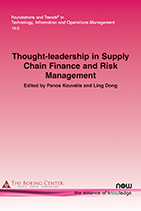Crowdfunding Adoption in the Presence of Word-of-Mouth Communication
By Fasheng Xu, Syracuse University, USA, fxu107@syr.edu | Xiaomeng Guo, Hong Kong Polytechnic University, Hong Kong, xiaomeng.guo@polyu.edu.hk | Guang Xiao, Hong Kong Polytechnic University, Hong Kong, guang.xiao@polyu.edu.hk | Fuqiang Zhang, Washington University in St. Louis, USA, fzhang22@wustl.edu
Abstract
In the fast growing markets of crowdfunding, firms launch projects not only to raise funding directly from the crowd to cover early stage investment, but also to expand product awareness via word-of-mouth (WoM) communication. In this monograph, we investigate a firm’s optimal funding choice when launching an innovative product in the market with WoM communication. We characterize the firm’s optimal quality and pricing strategies under both crowdfunding and traditional bank financing, and compare these two funding choices and their corresponding welfare implications. Among other results, we show that crowdfunding is a preferable funding choice for a project when (its success probability is below an adoption threshold). More active WoM communication always benefits the firm and favors crowdfunding adoption. However, product quality may either increase or decrease as WoM expands. Consumer surplus and social welfare always increase as WoM communication becomes more active.
Thought-leadership in Supply Chain Finance and Risk Management
This monograph contains six thought-leading contributions on various topics related to supply chain finance and risk management. The issue culminated out of a recent (May 14-16, 2021) mini-conference on “Supply Chain Finance and Risk Management” organized by The Boeing Center for Supply Chain Innovation (BCSCI), Olin Business School, Washington University in St. Louis.
In “Quadratic Hedging and Optimization of Option Exercise Policies”, Nicola Secomandi explores a model for optimizing option exercise policies under any given equivalent martingale measure and anchoring quadratic hedging to the resulting value of the policy. In “Operations Revenue Insurance”, Paolo Guiotto, Andrea Roncoroni and Roméo Tédongap propose a new framework for the optimal design of a financial instrument to hedge nonclaimable risk embedded by business and operating revenues. In “Crowdfunding Adoption in the Presence of Word-of-Mouth Communication”, Fasheng Xu, Xiaomeng Guo, Guang Xiao and Fuqiang Zhang investigate a firm’s optimal funding choice when launching a product in the market with word-of-mouth communication. In “Data Sharing in Innovations”, Zhi Chen and Jussi Keppo discuss how the success of data-driven products depends on a firm’s access to big data and the challenges of data collection and sharing in innovations using the autonomous vehicle industry as an example. In “Coordination Problems in Platform Markets Under Uncertainty”, Hamed Ghoddusi presents a dynamic coordination problem under uncertainty that is common in platform markets and provides novel insights on this problem between two sides of a platform under uncertainty. In “Value Games”, Matthew J. Sobel shows that insights and algorithms based on sequential games with a profit criterion and negligible bankruptcy risk can be adapted to maximize value.

Companion
Foundations and Trends® in Technology, Information and Operations Management, Volume 15, Issue 3 Special Issue: Thought-leadership in Supply Chain Finance and Risk Management
See the other articles that are also part of this special issue.